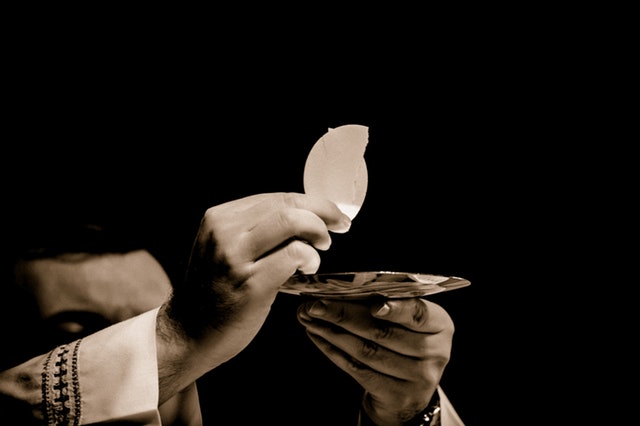By Fr. Marcel Uzoigwe, CSSp.
Today, the universal church celebrates the Solemnity of the Body and Blood of Jesus Christ. This feast was established and extended to the Universal Church by Pope Urban IV in 1264 to celebrate the Real Presence of the Body and Blood, Soul and Divinity of Jesus Christ in the elements of the Eucharist. During the Last Supper, while at table with his disciples, Jesus took bread, said the prayers, broke it and gave it to his disciples saying: take this all of you and eat of it, for THIS IS MY BODY. The same he did with the wine saying: “THIS IS MY BLOOD”. He then commanded them to “do this in memory of me.” These same words are repeated by the priest during consecration because the Eucharist is NOT a symbol of the Body and Blood of Jesus Christ but the REAL presence of Jesus Christ.
Jesus makes the most perfect gift of himself to us in the Eucharist out of his love and desire to be intimately united with us at all times. Love manifests itself in giving, and the greatest gift is that of oneself. The readings of today deal with the subject of giving or offering of something. The first reading related the encounter of Abram with Melchizedek on his return from a victorious battle. Abram offered a tenth of all his spoils to the priest of the Most High God, Melchizedek, who blessed him. Melchizedek in turn offered bread and wine in thanksgiving to God on behalf of Abram. The offering of bread and wine foreshadowed the event of the Eucharist which Jesus, the perfect high priest of the new order, offered for the salvation of mankind.
The Gospel reading touched on the same theme of giving without counting the cost, a symbol of boundless love. Having taught the people for several days, Jesus felt their physical hunger and lack of bread. Rather than sending them away to go and fend for themselves, he decided to do something instead, to find a way to feed them. Jesus had no bread himself. John’s account of this event (John 6: 9) has it that there was a young boy with five loaves and two fish, and was willing to offer them up for the good of everyone rather than focus on his own personal need for them. Jesus took the bread and fish, said the prayers and set them before the people. What could not be enough for a few persons was sufficient to feed over five thousand men and twelf baskets of leftover were gathered afterwards. The extent to which true charity can go is unfathomable. That is why it is more blessed to give than to receive (Acts. 20:35).
Aware of the constant human weaknesses and spiritual poverty, Jesus freely offers himself to us in the Eucharist, in such an unconditional love that the human mind can hardly grasp. He invites us to eat of him who is the true bread that comes down from heaven and gives life to the world (John 6:51). Vatican II in Lumen Gentium 11 declared that the ‘The Eucharist is “the source and summit of the Christian life.”’ The Catechist of the Catholic Church (CCC 136) reaffirms this and added that “The other sacraments, and indeed all ecclesiastical ministries and works of the apostolate, are bound up with the Eucharist and are oriented toward it. For in the blessed Eucharist is contained the whole spiritual good of the Church, namely Christ himself, our Pasch … It is the culmination both of God’s action sanctifying the world in Christ and of the worship men offer to Christ and through him to the Father in the Holy Spirit” (CCC 137-138). In his first letter to the Corinthians, which forms the second reading, St. Paul recounts the event of the Eucharistic celebration as a tradition which he himself received and transmits. The Eucharists became the center of Christian communities that began with the apostles of Jesus Christ and has continued down to our time. It is the command of Jesus himself that we do it in his memory.
The famous Dutch priest, Henri Nouwen, in his teaching on becoming the beloved (https://www.youtube.com/watch?v=3-bGS8sysjY) sought to illustrate how the actions of Jesus in instituting the Eucharist summarise the life of Jesus and that of us all as the beloved of the father. In doing that he virtually used the words of St. Paul in the second reading to illustrate the sequence: Jesus took the bread, said the blessing, broke it and gave it to his disciples. The four words: Taken, Blessed, Broken and Given, according to him, summarize the life we are called to live in the footsteps of Jesus. Jesus, the beloved, unique and anointed son of the father allows his blessed life to be taken, broken to the utmost, and given for the life of the world.
As we celebrate the solemnity of the Body and Blood of Jesus Christ today, let us call to mind the immeasurable gift of himself that Jesus makes to us. A gift that led him to a great suffering and pain, and continues to hurt whenever we abuse his body and blood in the Eucharist. Let us also call to mind that we all, as members of his mystical body – the Church – are called to offer ourselves daily for the good of others. Difficult and painful as this may sometimes be, the Eucharist offers us the spiritual strength to walk in the footsteps of Jesus Christ and make of our lives an offering to God for our brothers and sisters.
(Homily delivered by Fr. Marcel Uzoigwe on 23 June, 2019)
